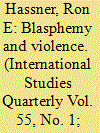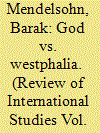| Srl | Item |
| 1 |
ID:
103302


|
|
|
|
|
| Publication |
2011.
|
| Summary/Abstract |
Why did riots in response to the 2005 Danish cartoons depicting the Prophet Muhammad occur in nine Muslim states but not in 43 other states in which Muslims form a majority of the population? I show that the location of the cartoon riots is best explained by combining insights from the study of politics with arguments from the sociology of religion. Protests were mobilized by radical Islamist movements alarmed by the moral threat posed by the blasphemous cartoons. In states characterized by political rights and civil liberties, regimes responded haphazardly to the demonstrations, leading to confrontations between security forces and angry rioters. This finding can be generalized beyond the Muslim world: We should expect reactive religious violence wherever fundamentalist movements are confronted by transgressive acts, committed by threatening opponents, in a political environment that permits protest but fails to protect the religious principles of the movement.
|
|
|
|
|
|
|
|
|
|
|
|
|
|
|
|
| 2 |
ID:
113300


|
|
|
|
|
| Publication |
2012.
|
| Summary/Abstract |
This article presents the operation of al-Qaeda and Hizb ut-Tahrir, two of the most radical Islamist movements, through the lens of the relationship between religion as an organising principle for world politics and the state-based logic. It examines these groups in the context of repeated attempts by religious actors throughout history to render religion the dominant and constitutive element in world politics. Prior to the Peace of Westphalia, religion had a critical role in shaping the political landscape, but Westphalia relegated religion to a secondary position. While it accepted religion's role in the domestic affairs of the units in the international system, the Westphalian order kept religion subordinated to the logic of the state system. But religion maintained its ability to provide an alternative organisation for world politics. While al-Qaeda and Hizb ut-Tahrir are highly unlikely to bring about systemic change, their ascendance should remind scholars that the existing order is not inevitable and that the resurgence of religion in international politics also involves the resurrection of interpretations of religion that compete with and challenge the logic of the state-based system.
|
|
|
|
|
|
|
|
|
|
|
|
|
|
|
|